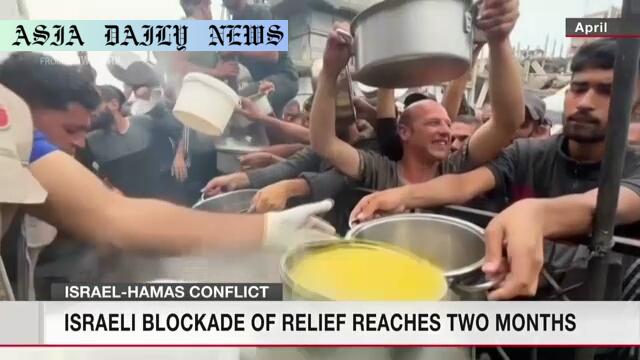Blockade – Israel’s blockade of critical aid to Gaza has now carried on for two months, leaving the region in a dire humanitarian situation.
- Israel’s blockade of Gaza has lasted two months, leading to a humanitarian crisis.
- Critical food and medicine have been restricted since March 2, affecting children the most.
- Plans to ‘radically alter’ aid distribution aim to prevent aid from reaching Hamas fighters.
- Houthi rebels in Yemen claim responsibility for a missile launch against Israel during the crisis.

The Crisis in Gaza: Two Months of Blockade
The humanitarian situation in Gaza has entered a devastating phase as Israel’s blockade of food and medical aid reaches its second month. While officials justify the blockade as a means to pressure the Islamic group Hamas, the consequences for civilians, especially children, have been catastrophic. On March 2, Israel initiated the aid halt, locking out crucial supplies needed to sustain basic living conditions in Gaza. Civilians bear the brunt of this decision, with medical experts warning of physical and psychological trauma among the region’s most vulnerable populations.
The effects of the blockade have been characterized by a rapid escalation of health crises. Hospitals in Gaza are running out of essential medicines, leaving children and other vulnerable groups exposed to life-threatening conditions. Medical professionals and global humanitarian organizations have raised alarms, emphasizing that this is a crisis with long-term ramifications. Michael Ryan, executive director of the World Health Organization’s emergencies program, has described the situation as “breaking the bodies and the minds” of affected children.
Radical Measures and Policy Contention
Israel’s decision to overhaul the way relief supplies reach Gaza has further complicated the crisis. Officials suggest that their new plans aim to prevent aid from falling into the hands of Hamas fighters. However, the approach has been met with criticism from international humanitarian workers, who highlight the ethical dilemma of prioritizing political objectives over human welfare. The Times of Israel reports that these new measures are expected to roll out in the next few weeks, contributing to growing uncertainty about how aid will be distributed moving forward.
Adding another layer to the conflict, Houthi rebels in Yemen have stepped into the geopolitical fray, claiming responsibility for a missile attack aimed at Israel. Although Israeli military forces successfully intercepted the missile, media reports indicate that fragments from the downed missile caused minor damage in civilian areas. While there were no casualties reported, this incident is a testament to the heightened tensions and the ripple effects of the blockade on regional stability.
The Role of International Organizations
International organizations have stepped up their pressure on global leaders to take action. Humanitarian groups have called the blockade an “abomination,” urging all parties to respect the rights of civilians during conflict. The World Health Organization continues to issue urgent calls for unimpeded access to Gaza, stressing that further delays in supplies will exacerbate the deteriorating conditions and increase the toll on human lives.
Despite concerted international appeals, there seems to be little sign of a resolution to the current crisis. Analysts are warning that the failure to address these urgent humanitarian needs could result in long-term destabilization, not just in Gaza but across the Middle East. For the children and families caught in the crossfire, however, immediate relief is the only concern.



Commentary
The Human Cost of Blockades
The two-month blockade imposed on Gaza is a stark reminder of how political conflicts often leave civilian populations to bear the unbearable burden. While nations have an inherent right to safeguard their security, it is deeply troubling when these measures lead to widespread human suffering. The current crisis, as described by medical professionals, is not just devastating; it is morally reprehensible. Striking a balance between security and humanity should be the guiding principle in any such conflict.
Impact on Children and Future Generations
Perhaps the most distressing aspect of the ongoing situation is its impact on children. Children are perhaps the most innocent and vulnerable group in any conflict, and yet, here they stand at the forefront of this humanitarian disaster. Deprived of food, medical care, and a sense of stability, these children are facing physical and emotional scars that might never heal. This is not just a temporary crisis; it is shaping a generation that could grow up in perpetual trauma and resentment.
The Need for Global Responsibility
It is incumbent upon the international community to act decisively during times like these. While aid organizations have spoken up, the lack of tangible, timely action from global leadership is unsettling. The blockade on Gaza is not just a regional problem; it is a global call to rethink how humanitarian aid can bypass political objectives to reach those who need it most. If immediate steps are not taken to provide relief, the world risks allowing another generation to grow up in a devastated environment shaped by neglect and suffering.